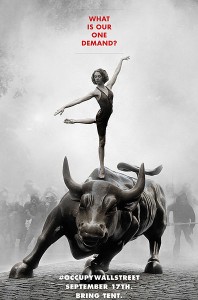Injustice
THE DOMINANT cultures of North America have long struggled to take responsibility for the suffering and injustice inflicted upon the Indigenous Peoples of the continent. The archetypal “us/them” story of cowboys and Indians remains at the core of North American national identities, from derogatory sports mascots and symbols such as the Washington “Redskins” and the “Chief Wahoo” character of the Cleveland Indians to the ignorant “redfacing” by non-Indigenous partygoers and trick-or-treaters in contrived Indian outfits. And this situation is nowhere near ending, despite many years of cultural sensitivity training and education.
Such overt racism should never be acceptable today. Yet it persists in regard to Indigenous Peoples. Why is this? As one friend remarked to me, most modern-day Americans believe injustices done to Indigenous Peoples to be a thing of the past.
But are they? Steve Heinrichs, director of Indigenous relations for the Mennonite Church in Canada, has brought together nearly 40 theologians, activists, writers, and poets—half of whom are Indigenous—to create Buffalo Shout, Salmon Cry: Conversations on Creation, Land Justice, and Life Together, a challenging anthology on Indigenous-Christian relations, stolen land, racism, and the impending environmental crisis that we all must face together.
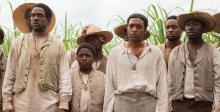
IN OCTOBER, Sojourners hosted a Washington, D.C. premiere for the faith community of the extraordinary film 12 Years a Slave. The compelling story about Solomon Northup—a free man from New York who was kidnapped and sold into slavery—is an accurate and well-produced drama, worth seeing for its cinematic merits, but primarily as a start to a conversation about race in America that is long overdue.
In her New York Times review titled “The Blood and Tears, Not the Magnolias,” Manohla Dargis wrote that 12 Years a Slave “isn’t the first movie about slavery in the United States—but it may be the one that finally makes it impossible for American cinema to continue to sell the ugly lies it’s been hawking for more than a century.” The film reveals how morally outrageous the slave system was, and it is very hard to watch.
The enslavement of millions of people of African descent by white Americans was always violent, and too intense for most white people to really accept the truth. Most white people, white Christians, and white churches tolerated slavery for 246 years. This historically horrendous evil existed because we tolerated it. That’s why evil always continues to exist: because we tolerate it.
What do we tolerate today? We tolerated the gratuitous evil of slavery, and still tolerate the devaluing of black lives. We tolerate completely dysfunctional urban schools, but would we still do so if they were full of young white children? We tolerate a criminal justice system where the racial disparities between white and black arrests, convictions, and sentencing are abundantly clear, resulting in the mass incarceration of men of color. We tolerate murder rates for people of color that we would never tolerate for whites. We tolerate racial profiling of young black men, with results that we would never accept for our white teenage boys. And we tolerate deliberate and clear political efforts to diminish the votes of minority communities.

Duane Buck currently sits on death row in a Texas jail cell partly because he is black. He has been held since his 1997 capital sentencing hearing, which was influenced by blatantly racist testimony. Trial prosecutors relied on erroneous “expert testimony” provided by psychologist Walter Quijano, who claimed African-Americans are more liable to commit future acts of violence than non-African-Americans.
Swayed by the misinformation, jury members accepted as truth Quijano’s claims. According to Texas law, a jury finding of “future dangerousness” is a prerequisite for a death sentence. Consequently, Buck was convicted in the fatal shootings of Debra Gardner and Kenneth Butler and issued the death penalty.

THE CELEBRATED PHILOSOPHER Ludwig Wittgenstein used to speak—disapprovingly—of “language going on holiday.” For example, sportswriters often free language from the drudgery of everyday common usage to let it spread its wings in glorious hyperbole about their favorite teams.
Our biblical heritage gives us examples that are much deeper. When we read the prophets especially, we hear language liberated from the constraints of the everyday to give it a sacred vacation, a true “holy-day,” so that it can return to us reinvigorated. We hear them sending language on an adventure holiday into the realm of God’s future. When they receive the words back, the prophets find themselves recounting visions of a new world that God has in store.
Eschatological language that has been to the future and back exerts a powerful authority over us. In this month’s scriptures we experience that authority again in Isaiah’s unforgettable oracles about the holy mountain on which no one shall ever again hurt or destroy. We shall see, with our mind’s eye, the rising of the sun of righteousness with healing in its wings. We shall hear Jesus speaking of the life waiting for the children of the resurrection. The church’s year ends by inviting us to enter under the authority of the coming kingdom, to become fluent in its strange language of hope, harmony, and ultimate reunion with the Holy One who has reconciled all creation through the cross and resurrection.

Oddly, I wasn't there the night George Zimmerman shot Trayvon Martin. I wasn't in the jury box either. Some commentators, like Ezra Klein and Ta-Nahesi Coates, are saying the not guilty verdict was appropriate according to Florida's "stand your ground" law. (Note that they are not saying that the Florida law is appropriate; Klein uses the word outrageous).
If this verdict was appropriate, though, what about verdicts in cases that were similar except for the color of the defendant? What happened to the "stand your ground" law when the jury reached its verdict against Marissa Alexander — an African American woman from Jacksonville, Fla.?
And anyway, why should fear of attack justify shooting to kill? It didn't in the case of John White — an African American man from Long Island, N.Y. — who shot a (white) teenager in 2006 (accidentally, he says, when the boy was trying to grab his gun).
John White, it appears, had good reason to fear the boys who showed up on his doorstep that night. That's probably why the governor commuted his sentence after he had served five months. And White no doubt should have served some time, according to New York law — his gun was unregistered, and if he hadn't been holding it when he went to the door, a scuffle probably wouldn't have escalated into manslaughter.
But, some say, the only thing that stops a bad guy with a gun is a good guy with a gun. Is this true?

When I was invited by the Drug Policy Alliance to participate in a pastors’ conference at the American Baptist College in Nashville on drug decriminalization, I didn’t know quite what to expect. In a room filled with African-American pastors, I felt like a fly on the wall of someone else’s family reunion. I began to see our criminal justice system, and our country, through different eyes.
I’ve reported on the conference elsewhere, but there I learned that while 13 percent of drug users are African-American, they account for 38 percent of drug arrests and 59 percent of drug convictions. Feeling disproportionately targeted, the pastors want drug usage to be treated as a health issue rather than a crime.
As the conference unfolded, it dawned on me that I, as part of the majority culture, perceive law enforcement in ways strikingly different from the way many African-Americans see it. I have always experienced American authorities as my protector. If the police pull me over for speeding, it is nothing more than an annoyance, and the ticket won’t break me. Though I’m no fan of traffic cameras and drones, for the most part the police are there to watch out for me, and they do. It has always been that way for my family, as we can trace our roots of privilege back to Northern Europe in the early 1500s. Those in charge are the good guys who protect us and our stuff.
But for these African-American pastor-friends of mine, it’s a different story.
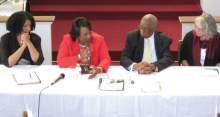
BERNICE KING watched as, one by one, the heads of denominations from across the nation bent down to sign the Christian Churches Together in the U.S.A. “Response to Dr. Martin Luther King Jr.’s ‘Letter from Birmingham Jail.’” Transfixed, King—Martin King’s daughter—sat in the first row of a church one block from Kelly Ingram Park, where 50 years before children had run scared, ravaged by German shepherds and fire hoses.
As they signed, the presidents of CCT’s five church “families” stepped to the podium. Each read his or her church family’s confession of complicity with the demons of racism and injustice during and since the civil rights era.
Fifty years ago, Martin Luther King Jr. sat behind bars in the Birmingham city jail and responded to criticism from eight local white clergy’s “Call for Unity” against outside agitators. King penned prophetic words in the margins of the newspaper that carried the white clergy’s call for “law and order and common sense.”
“Injustice anywhere is a threat to justice everywhere,” King explained. He recounted the failed attempts to negotiate with city officials hell-bent on living a “monologue rather than dialogue.” He clarified: “The purpose of our direct-action program is to create a situation so crisis-packed that it will inevitably open the door to negotiation.”

We started making our new documentary “Redemption of the Prosecutor” for the same reason we always do: someone told us a story.
Bill Mefford works in the social justice office of the United Methodist Church, and he called us last August to say he’d just seen an amazing talk. The talker was one Preston Shipp, a devout Christian and former prosecutor from Nashville who went into a local prison to teach. When Preston heard the inmates’ stories, he began to realize how unjust the system was. He was especially torn up about an inmate named Cyntoia, who was Preston’s star student and had received a life sentence as a juvenile. Preston underwent a spiritual crisis that boiled down to a fundamental question: “How can I reconcile the job I was being asked to do as a prosecutor with my faith in Jesus, who proclaimed release for prisoners?” We won’t give away the ending, but there’s a surprising twist that left us saying this is a story that needs to be told in churches across America.
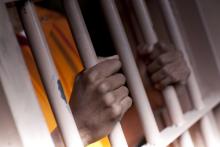
The United States has the highest incarceration rate in the world; one third of those incarcerated are serving long-term sentences for petty, non-violent crimes. One out of three African-American men will serve some sort of time under present law enforcement practices and the current criminal justice system. In Washington, D.C., that number jumps to an estimated three out of four. The United States imprisons a larger percentage of its black population than South Africa did at the height of apartheid.
More than 50 people gathered at Emmanuel Church of God in Christ in southeast Washington, D.C., on Sunday afternoon to hear the Rev. Louis Hutchinson remind them of these facts. Rev. Donnell Smith called the trend: “legalized discrimination.”

For the sake of the world, we should all be feminists. And given what we know about the role of independent, empowered women in the community of disciples, for the sake world, we might be “Christians.”
Raymond Brown, the late, great scholar of John, writes: “In this Gospel, where light and darkness play such a role, darkness lasts until someone believes in the risen Jesus.”
Therefore no darkness, no heartbreak, no grief, no injustice can long stand where the Risen Christ is proclaimed. Jesus Christ is the light of the world. The light shines in the darknessa and the darkness does not — cannot — will not overcome the light.

While having lunch recently with Harvard Professor Robert D. Putnam, I was asked an interesting question.
Putnam is appalled at the radical lack of equality of opportunity in the U.S. today, and he wanted to know if evangelical preachers would dare to say what his pastor said when he was a teenager. Putnam told me that back then, in the midst of Martin Luther King’s great campaign against segregation, his devout Methodist pastor dared to preach that “racism is a sin.”
Professor Putnam asked me, as an evangelical, whether evangelical pastors today would be ready to declare today’s great economic inequality of opportunity a sin. That’s a great question.
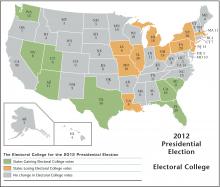
The United States is the only democratic country in the world where a candidate can be elected as president without earning the highest number of votes.
In the midst of competing campaigns and critical choices leading up to Election Day, one of the most common assumptions is that U.S. citizens directly select their president. However, far too many fail to fully understand that such direct selection is not our reality, for within our complex electoral system – known as the Electoral College – the will of the people does not always translate into final results. During the presidential elections of 1876, 1888, and 2000, the leader in popular votes did not claim victory, and some believe a similar scenario may take place in the near future. And so, when a candidate receives the majority of votes but is not sworn into office, we recognize a gross injustice that requires immediate and significant transformation.

Yesterday, I was walking through Dolores Park and heard a street preacher, saying "If you've ever stolen a stick of gum, then you are guilty of sin! If you've ever looked at Facebook at work, then you've stolen from your employer, and that's sin!"
Of course we all know where he was headed: If we have sinned—even with a trivial infraction like a stick of gum—then God who is holy must punish us for all eternity in Hell unless we accept Jesus right now.
I mean, seriously, gum? Why can't God just get over it? Is God less moral than all of us are? This is not a picture of holiness, it is a picture of a petty tyrant. Aside from the horrible picture of God that this gives us (and honestly, who could ever love, trust, and feel safe around a God like that?), what this ultimately does is trivialize sin. It makes sin into a petty infraction of little consequence.

I struggle to know how much is enough. I hear about Joseph Kony and the many children he’s exploited as child soldiers. I get angry, discouraged. I write about it, talk to friends about it.
And then my life keeps moving and I don’t think about it again for days or weeks.
Trayvon Martin, an unarmed teenager, is gunned down on the street. The nation is divided, both outraged about the killing and fearful of the threat to gun rights and laws of self-defense.
And then we talk about something else.
Today’s issues include the nuns going head-to-head with the Vatican, as well as stories about still more preachers being busted for spousal abuse, or expelled from their jobs because of their sexual orientation.
Tomorrow it will be something else.
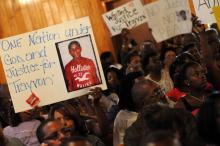
On February 26, 2012 in Sanford, Fla., George Zimmerman shot and killed Trayvon Martin, an unarmed 17-year-old boy. Zimmerman, 28, a neighborhood watch "captain," says he was acting in self-defense, and — incredibly — Zimmerman has yet to be arrested or charged with a crime.
However, thanks to the organizing efforts of Mr. Martin’s parents, civil rights groups, media commentaries, and concerned citizens, our latest racialized miscarriage of criminal justice is now getting the widespread attention that it deserves.
On Monday, the US Department of Justice and the Federal Bureau of Investigation (FBI) announced it would launch an independent investigation into the causes and circumstances of Mr. Martin’s death.
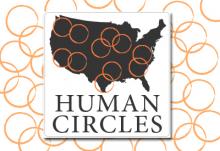
It’s time for people of faith to get up off the couch, out of the pews, and MOBILIZE!
THIS WEDNESDAY Sojourners and other groups in support of the Circle of Protection will coordinate Human Circles of Protection, a national effort by people faith to show congress and the world that Jesus followers want an America where our credo is bond: liberty and justice for all!
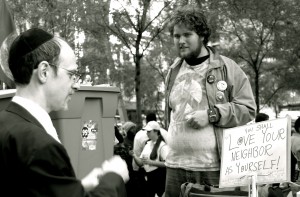 We're in this thing together or we're not in this thing at all.
We're in this thing together or we're not in this thing at all.
We should all be marching in the streets.
We are the 100 percent.
We are poor. We are well-to-do. We are those somewhere in the middle. We are aware of the struggles and unfairness of this world and for this reason we are sensitive to one another's needs. So, we love our neighbors as ourselves.
As I read the blogs and watch the news about what's happening in New York and around the country, I can't help but wonder: If Jesus were walking the streets of New York today, would he be a rabble-rouser activist like he was at the temple, or would he walk up to the CEO of Goldman Sachs and give him a hug?
This Sunday (Oct. 9) , Sesame Street will introduce a brand-new Muppet character — a magenta-faced, impoverished 7-year-old named Lily who represents one of the 17-million Americans who struggle daily with hunger and poverty — during a rare prime-time special called, "Growing Hope Against Hunger."
From the official statement by #OccupyWallStreet: "As one people, united, we acknowledge the reality: that the future of the human race requires the cooperation of its members; that our system must protect our rights, and upon corruption of that system, it is up to the individuals to protect their own rights, and those of their neighbors; that a democratic government derives its just power from the people, but corporations do not seek consent to extract wealth from the people and the Earth; and that no true democracy is attainable when the process is determined by economic power."
